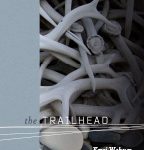
The following is an excerpt from the review “Forging a Place: Love, Violence, and Identity in Four New Poetry Collections,” by Robert Peake, in Poetry Salzburg Review, no. 34. Summer 2019.
The Trailhead by Kerrie Webster will be available in paperback in March 2020.
Kerri Webster’s accomplished The Trailhead takes readers on a journey through landscapes of desire, isolation, and fear. In the eponymous novella by Virginia Woolf, Mrs. Dalloway “always had the feeling that it was very, very, dangerous to live even one day.” So too is it danger-ous to inhabit the world Webster portrays.
In these poems violence is gendered, sexual, and ubiquitous. Its pervasiveness is signaled by casual but constant reference. “Hill Walk” (4) begins, “Come let us poison all the honeybees” and in “The Night Grove” (10) “The torturer wants to know / how one minute blood, one minute / snow. She wants the windows / closed. The draft. Light breaks / across his back.”
Here the typical association of torturer as male is pulled abruptly from under foot. The poem continues to recognise and subvert the gendered nature of sexual violence, ascribing traits to “the torturer” of that more familiar incarnation of pain-inflicting female: the dominatrix. Once again couched in casualness, “She says, some boys on the news shot a swan.” (11) This sparks a philosophie dans le boudoir, examining the nature of the human impulse to harm as well as comfort. In an artful collision of maternal and sadistic instinct, “She says, I want to hold those boys / close, and then / I want to shatter their finger bones.”
The appearance of “Officer Cocksure” (“Conversion Narrative”, 23-28) offers another gendered narrative of violence, sexuality, and authority. The name says it all. In “Toward an Ethical Religiosity” the boys who shot the swan recur, and again the overt violence is covered over with a kind of mythical turning of the tables, as it concludes, “Over lunch we discussed the loneliness / of men. I ate / the killed animal / among the leaves.”
The work succeeds through a mix of razor-sharp enjambment – reminis-cent of a poet like Louise Glück – and the pairing of startling imagery and con-fident, declarative philosophical state-ment. Regarding the danger and painful-ness inherent in living, Webster plunges us in media res into a birth scene: “I re-member a girl screaming on the clinic floor – water feature out front aping beauty – her shrieks shattering the follicles of my right ear – the koi gaping – I wanted to kneel beside her on the stained carpet and say Yes. Exactly. All of us.” (“Conversion Narrative”, 23)
In “Skins” (45-47) the image of the “blue-tinged” wings of the recurrent dead swan are compared to how “The trees slough off blue skins.” (45) Couched between these two images the speaker declares, “When people call a woman / ‘shy’ they generally mean / ‘afraid’, translating quiet / to a comfortable thing.” (45) So the declared language of gender and implied violence recurs in checkerboard with deftly-honed imagery, creating a pattern. In “One Eye Dilated” (42-43), in what could stand for a poet’s motto, she follows a series of confessions that include worrying that “the condom got lost inside me or something blotted out the sun” [156] with the revelation: “It has taken me forever to be obedient to the beautiful, rather than the easy, things.” (43)
Webster packs the same effective techniques into the territory of sensuality and smarts. In the character of “Spinster” (“The Spinster Project”, 32-35) the reimagined bluestocking weaves threads of a life at once deeply sensual and mundane: “Spinster wants to literalize your desire inside her mouth.” and “Spinster kills what botanists say even a monkey could water.” (34) In “Of Deborah” (29-30), her Cassandra stand-in grapples with terrible knowledge unacknowledged, drawing out a pristine metaphor for the highly-educated woman in a world rife with mansplaining. Yet for all her power, in the end she is reduced to small acts and parlour tricks as she “reaches out to catch the bowl of plums / before it begins falling.” (30) Deeply skilled and forcefully honed, The Trailhead offers to take us deep into the back country of the human psyche, continuously pointing out the beautiful-but-uneasy territory, line by staggering line.
Each of these four collections – whether sparkling debuts or the capstone of an accomplished career – hammer out a place for them-selves and their author’s concerns amidst the complexities of the past, the sensuality of the present, and the anxiety of a self deeply aware of its connection to a brutal, beautiful world.
ROBERT PEAKE is a British-American poet living near London. He studied poetry at U.C. Berkeley and in the MFA in Writing program at Pacific University, Oregon. His poems appeared in Iota, Magma, North American Review, Poetry International, and Rattle. Poetry Salzburg published his pamphlet The Silence Teacher in 2013. He has published two full-length collections, The Knowledge (2015) and Cyclone (2018, both Nine Arches).
KERRI WEBSTER is the author of the poetry collections We Do Not Eat Our Heats Alone (University of Georgia Press, 2015) and Grand & Arsenal (University of Iowa Press, 2012), which won the Iowa Poetry Prize.
More about Poetry Salzburg Review








